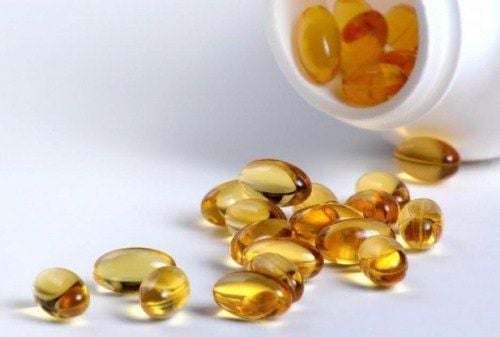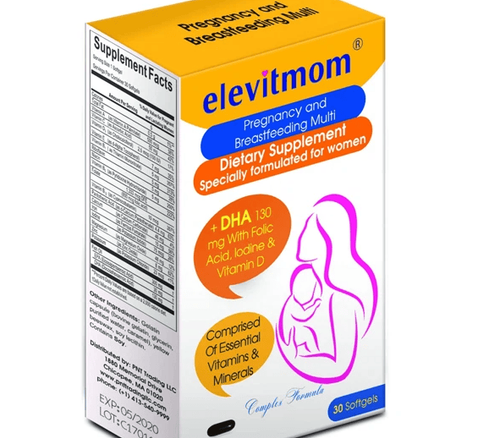This is an automatically translated article.
DHA - docosahexaenoic acid, is an omega-3s acid. The human brain needs DHA for growth, development, and maintenance. Should you continue to supplement DHA for your baby? Despite the proven importance of DHA for eye, brain and nervous system development, many infants and toddlers still don't get enough of it. If a nursing mother does not have adequate omega-3 levels, a DHA supplement should be given to a nursing infant or toddler. Non-breastfed infants and toddlers can benefit from 500-800 mg of DHA per day.
1. What are DHA and omega-3?
Before answering whether to supplement DHA for your baby, parents need to understand what DHA is. DHA (docosahexaenoic acid) is one of the three main types of omega-3s, along with alpha-linolenic acid (ALA) and eicosapentaenoic acid (EPA). Omega-3s are essential fatty acids for many aspects of health, including fetal development, brain function, heart health, and the functioning of the immune system. They are considered essential fatty acids because the body cannot produce them on their own and must be obtained from external food sources.
ALA is found in many plant-based foods, including vegetable oils, nuts, and certain vegetables. However, ALA does not work on its own in your body and needs to be converted by the body into the active forms, such as DHA and EPA, in very small amounts.
Meanwhile, EPA and DHA are abundant in fatty fish, such as salmon, mackerel and tuna, and are widely available in dietary supplements. There are many types of omega-3 supplements on the market today, the most common types being fish oil, krill oil, and algae oil.
2. Benefits of DHA for children
Many studies suggest that children need dha supplements as it may provide some benefits for children.
May improve symptoms of ADHD - Attention Deficit Hyperactivity Disorder. This is a common condition associated with symptoms such as hyperactivity, impulsivity, and difficulty concentrating. Some studies indicate that omega-3 supplements may help reduce symptoms of ADHD in children. A review of 16 studies found that omega-3 fatty acids improved memory, attention, and learning ability, and reduced the expression of hyperactivity. A 16-week study in 79 boys found that taking 1,300 mg of omega-3s daily improved attention in people with and without ADHD. Furthermore, a large review of 52 studies concluded that dietary modifications and fish oil supplements are two of the most promising techniques for reducing ADHD symptoms in children.
Can relieve asthma . Asthma or bronchial asthma is a chronic condition that affects children and adults, causing symptoms such as chest pain, shortness of breath, coughing, and wheezing. Some studies have found that supplementing with omega-3 fatty acids helps reduce these symptoms. For example, a 10-month study in 29 children noted that taking a fish oil capsule containing 120 mg of DHA and EPA combined daily reduced symptoms of bronchial asthma. Another study in 135 children linked higher intakes of omega-3 fatty acids with a reduction in asthma symptoms caused by indoor air pollution. Other studies suggest a possible link between omega-3 fatty acids and a reduced risk of asthma in children.
Get better sleep. Sleep disorders affect nearly 4% of children under 18 years of age. One study in 395 children found lower blood levels of omega-3 fatty acids with a higher risk of sleep problems. Research also shows that supplementing with 600 mg of DHA for 16 weeks reduces sleep disruption and leads to nearly 1 hour more sleep per night. Other research shows that consuming more omega-3 fatty acids during pregnancy can improve sleep in babies. However, more quality studies on omega-3s and sleep in children are needed.

Để có những giấc ngủ ngon hơn thì trẻ có cần bổ sung dha
Enhance brain health. Emerging research indicates that omega-3 fatty acids can improve brain function and mood in children – particularly learning, memory and brain development. In a 6-month study, 183 children who ate high amounts of omega-3 fatty acids had improved verbal learning and memory. Similarly, a small 8-week study in 33 boys linked 400–1,200 mg of DHA per day with increased activation of the prefrontal cortex, the area of the brain responsible for attention, impulse control, and control. planning. What's more, some studies show that omega-3 fats help prevent depression and mood disorders in children.
3. Do children need DHA supplements?
Babies and toddlers are an important period of growth and development. In the span of a few short years, children go from crawling and rolling to running, babbling and talking. But these are not the only changes taking place. Children's bodies also undergo significant structural and functional changes during the first few years of development.
Newborns need adequate nutrition to meet the important changes that occur during early development, including the polyunsaturated fatty acids EPA (eicosapentaenoic acid) and DHA (docosahexaenoic acid). should be provided sufficiently. Because these basic nutrients influence many of the cell cycles and physiology involved in growth, EPA and DHA are considered crucial for normal development during infancy and early childhood. know walk.
DHA is required for the development and maturation of the infant's brain and retina, with great demand during pregnancy and the first years after birth.
Before birth, DHA is necessary for fetal development, mainly provided by placental transmission from the mother. After birth, babies must receive DHA through breast milk, DHA-fortified formula, or DHA (fish oil) supplements
Due to its prominent role in the underlying structure and function of the brain , the fact that a child gets enough DHA early in life can have long-term implications for their long-term growth; helps support infants' cognitive, social and physical development by promoting:
Vision and retinal development Language and cognition Motor and mental skills development Immune response healthy for allergens Intentional behavioral control

Trẻ có cần bổ sung DHA theo lứa tuổi và giai đoạn của trẻ
In contrast, studies have found that infants who do not receive enough omega-3s during their first years of life are more likely to experience negative consequences such as:
Delays in brain, motor and visual development Difficulty regulating attention Unhealthy immune response to environmental stressors Suboptimal physical development
4. Should you supplement your baby with DHA?
Daily need for omega-3 depends on age and sex. If you're taking a supplement, it's best to follow the directions on the package. However, arbitrarily supplementing DHA for babies should be considered. Best to prevent unwanted effects, parents should consult a doctor before giving your child the supplement. In addition, parents can include foods rich in omega-3s in their children's diets to ensure they are meeting their needs.
The side effects of omega-3 supplements, such as fish oil, are usually very mild and do not require medical intervention. The most common effects include:
Bad breath, unpleasant aftertaste Headache Heartburn Stomach pain Nausea Diarrhea Make sure your child follows the recommended dosage to reduce the risk of side effects side use. You can also start your child on low-dose oral supplements, gradually increasing the dose to assess tolerability. People with fish or animal allergies should avoid using fish oil and other fish-based supplements, such as cod liver oil and krill oil. Instead, choose other omega-3-rich foods or supplements like flaxseed or algal oil.

Cha mẹ có nên bổ sung dha liên tục cho bé hay không cần tham khảo ý kiến bác sĩ
5. Do all babies need an omega-3 supplement?
An infant or toddler will need an omega-3 supplement, which depends on several factors including:
The child's nutritional source, The amount of EPA and DHA the child is getting through food Developmental status of the child (eg age, weight). For exclusively breastfed infants, it is important to consider whether the mother's omega-3 levels are adequate. If a nursing mother has been tested and has an acceptable omega-3 level, direct omega-3 supplementation to the infant is not necessary. However, given the evidence that many women of childbearing age are not consuming enough omega-3s, it should not be assumed that nursing mothers have adequate omega-3 levels. Breastfed babies need the same supplements as non-breastfed babies.
Although many infant formulas are now fortified with DHA, the quantity and quality of DHA may be less than ideal (e.g. DHA concentration <0.3%, in ethyl- synthetic esters, etc.) and/or react poorly to oxygen or heat exposure, children may not receive the calculated amounts of DHA. Therefore, it is advisable to supplement with high-quality, triglyceride-formed omega-3 fish oil.
Older children can consume regular dietary sources of EPA and DHA to support overall health and development (2-3 times a week) which should be considered when deciding whether to supplement or not. are not. Since consuming 2-3 servings of fish per week can be difficult for young children, a fish oil supplement may be a more affordable way to satisfy a child's palate.
To help children develop comprehensively, in addition to supplementing with DHA for children, parents should supplement children with supporting products containing lysine, essential micro-minerals and vitamins such as zinc, chromium, selenium, and B vitamins. help meet the nutritional needs of children. At the same time, these essential vitamins also support digestion, enhance nutrient absorption, help improve anorexia, help children eat well, and develop comprehensively.
Please regularly visit Vinmec.com website and update useful information to take care of your baby and family.













